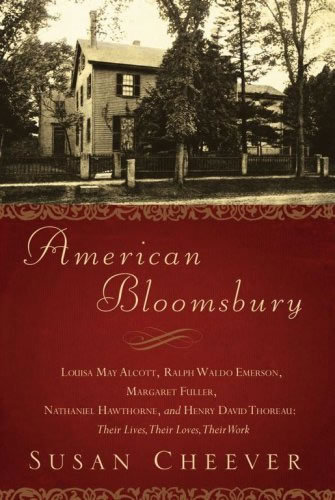
Director’s notebook
March, 2009
“Location. Location. Location.”
That is supposedly the chant that realtors or business people are always intoning when they consider what will make a house or a business succeed.
Now, how about this location?
Concord, Massachusetts … in the mid eighteen hundreds, when it earned its reputation as “the biggest little place in America”. A quiet and unexceptional, rather quaint New England town on the outside; but inside, behind the doors of the cottages and mansions and farmhouses of Concord, a roiling river of new thought, bold ideas, and superb creative talent.
How could it be otherwise when no less illustrious Americans than Henry David Thoreau, Ralph Waldo Emerson, Louisa May Alcott, and Nathaniel Hawthorne lived there, pretty much all at the same time? And those are just the biggest names; there were many less famous but equally exciting personalities such as Margaret Fuller, an early practitioner of liberated womanhood ,whose lives also intersected, often passionately, with the Concord luminaries.
American Bloomsbury, by Susan Cheever, is aptly named. Taking its title from the Bloomsbury neighborhood in early twentieth Century London that nurtured such creative talents as Virginia Woolf, E.M. Forster, and Vita Sackville-West, American Bloomsbury demonstrates that Concord, Massachusetts, from 1840 to 1868 contributed its own astonding galaxy of writers and philosophers.
First there was Emerson, philosopher and writer, gentleman, and in many ways, the support both emotionally and financially for the other writers of Concord. It was Emerson who helped Thoreau find a place to live, whether in the Emerson house or later in a little one room shack at the edge of a pond that Thoreau would later immortalize. It was Emerson who helped the young Hawthornes get themselves established and Emerson who time and again came to the aid of the impulsive and impecunious Bronson Alcott, father of Louisa May. Through all this generosity, Emerson somehow avoided the curse of the generous; he never seems to have aroused the jealousy of the friends he so kindly and tirelessly assisted.
Thoreau enjoyed Emerson’s friendship. He also maintained a very warm friendship with Emerson’s wife Lidian and at times seems to have stolen the affection of Emerson’s wife and children. Thoreau also captured the heart of the young Louisa May Alcott, who when she wasn’t mooning over Henry seems also to have developed a passion for Emerson as well. Emerson meanwhile seemed to have been strongly attracted to the writer/feminist Margaret Fuller, and she in turn seemed quite giddy about the handsome Nathaniel Hawthorne, whose delicate semi-invalid wife seems to have been his second choice, rather than his heart’s original desire.
Wow! Are we talking Peyton Place or Concord, Mass? It’s hard to tell at times, but this book does a wonderful job of taking the stuffiness out of these literary icons and presenting them as flesh and blood human beings who from their little village just happened to launch American literature and philosophy as we know it and study it today.
Woven in with the personal conflicts between the Concord residents are many interesting struggles on the social and political scene that thinking Americans would have had to grapple with in the nineteenth century. The slavery question, the rights of women, the rights of individuals vs. the government, the rights of states vs. the nation, individual freedom and community responsibilities, the education of children …all of these powerful and perplexing questions were grist for the minds of the Concord writers and thinkers.
Sometimes they agreed on these questions. Often they disagreed. But they never stopped exploring, questioning, taking sides, weighing in. They never stopped thinking that thinking mattered. Sometimes they staked their fortunes, their reputations, their friendships, and their family’s future on their beliefs. The country mirrored their passionate stances. This was a period of tremendous unrest and uncertainty for the United States. The fate of the nation hung by a thread, and that thread was frayed and ready to break.
American Bloomsbury is a breathless read; I could not put it down. Didn’t want to. I wanted to learn all I could about these wonderful creatures, Emerson, Thoreau, Alcott, Hawthorne; what made them tick, and what they cared about. I know I will return now to their books, books I last read in college that I now know are well worth revisiting. And I’d love to take a trip to Concord, Mass some fine summer day, to find some of their houses and farms, and daydream about the minds and the hearts they sheltered, more than one hundred and fifty years ago.




